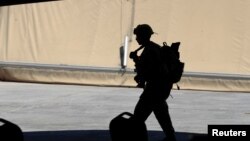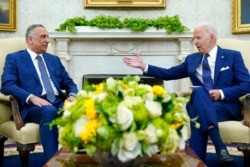The responsibility for leading the fight against the Islamic State terror group in Iraq has now shifted from the United States and its coalition allies to Iraqi security forces.
Iraqi officials made the announcement early Thursday, saying U.S. and coalition forces would remain only to provide support as needed.
"Cooperation will continue between Iraqi security forces and the international coalition on an advisory and support level," Major General Saad Maan, head of Iraq's Security and Media Cell, told reporters.
In a statement issued by the U.S.-led Combined Joint Task Force-Operation Inherent Resolve, the deputy commander of the Joint Operations Command for Iraq, Lieutenant General Abdul Amir al-Shammari, said the timing was right.
"Our soldiers have demonstrated their ability to maintain the defeat of Daesh," al-Shammari said. "We look toward the future with hope, providing stability, security, and prosperity for the men and women of Iraq."
Plans for the U.S. to end its combat operations in Iraq were first announced following a meeting between Iraqi Prime Minister Mustafa al-Kadhimi and U.S. President Joe Biden at the White House this past July.
The agreement called for the U.S. to end combat operations in Iraq by the end of the year, though U.S. officials said at the time that the change would not signal the end of the threat from the Islamic State group, also known as ISIS and Daesh.
"Nobody is going to declare 'mission accomplished,'" a senior U.S. official said at the time. "We recognize you have to keep pressure on these networks as they seek to reconstitute, but the role for U.S. forces and coalition forces can very much recede."
Major General Frank McKenzie, the top U.S. commander in the Middle East, said in an Associated Press interview, that despite a U.S. drawdown from Iraqi bases, the Iraqis still want to retain the U.S. presence and engagement within the country.
“So as long as they want it, and we can mutually agree that’s the case — we’re going to be there,” McKenzie said.
On Thursday, U.S. military officials expressed confidence that the new arrangement will keep IS on its heels.
"We are confident that the fruits of our strong partnership will ensure Daesh will not reconstitute," the commander of the U.S.-led coalition in Iraq, Major General John Brennan, aid in a statement. "We will remain here to advise, assist, and enable the ISF [Iraqi Security Forces], at the invitation of Republic of Iraq."
Despite the announcement, U.S. military officials have said the current state of anti-IS operations in Iraq is unlikely to change.
Pentagon press secretary John Kirby told reporters Thursday that the approximately 2,500 U.S. troops currently in Iraq are staying, at least for now.
"This is a change in mission, not a change in physical posture," Kirby said. "There won't be a dramatic shift from yesterday to tomorrow."
"The vast majority of what they've been doing for a while has been advise, assist and train," he said, adding those forces will retain the right to defend themselves if they are attacked.
Recent data from the U.S.-led coalition appears to support Kirby's claims, showing a dramatic decrease in the number of U.S. and coalition airstrikes against IS targets — with just three such strikes in the three months period from June to August, compared to 31 strikes over the previous five months.
U.S. and Western officials also note that Iraqi forces have managed some major successes, including the capture of one of IS's most senior leaders, Sami Jasim Muhammad al-Jaburi, also known as Hajji Hamid, this past October.
But some recent reports have also cast doubt on the ability of Iraqi forces to lead the fight against IS.
"The Iraqi Security Forces continued to demonstrate poor operational security, a lack of reliable information on operations against ISIS, complacency, and poor tactical control and coordination of strike assets," acting Defense Department Inspector General Sean O'Donnell wrote in a report released last month.
The report further quoted the U.S.-led coalition as saying that Iraqi forces made "no significant achievement," when carrying out anti-IS operations without coalition assistance.
VOA's Steve Herman and Carla Babb contributed to this report. Some information came from Reuters.







